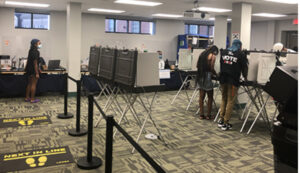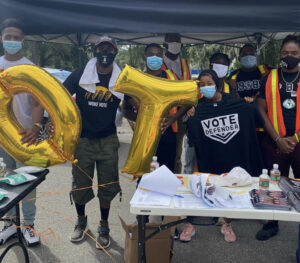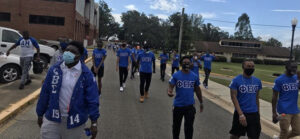
With 2020 election well underway, students are gearing up to exercise their right to vote and encourage others to do the same.
There has already been a record number of mail-in ballots in Florida as Election Day draws near, and still there are hundreds of students flocking to polls, volunteering to canvass the community and participating in school-wide events to raise awareness on the importance of voting.
Volunteering at the Polls
FAMU opened its doors to eager early voters Oct. 19, the first day of early voting. Lines formed outside the Student Union Multipurpose Center including both students and members of Leon County. Ready to cast their ballots students have been voting in-person or dropping off their ballots every day since then.
Some students have gone beyond just casting their ballots and even volunteered their time to work the polls and ensure voting goes without a hitch. Victoria Rogers-Rivera, a political science major, wanted to learn more about the election process and thought working the polls was the best way to do so.
“I wanted to be able to help with the election process because there is a lot of misinformation going around right now,” Rogers-Rivera said. “I have found out a lot about the local governing process here in Leon County through volunteering.”
If you are interested in volunteering at the polls, you can visit the Voting Office in the Student Union Multipurpose Center.
Canvassing the community
Outside the polls, students are also volunteering in community-wide canvassing events. Canvassing refers to the process of going out “into the field” and engaging potential or current voters directly. Normally, canvassing events would include going door-to-door, but with COVID-19 guidelines, volunteers have had to use other methods of reaching the community. Some of these methods include writing handwritten letters, calling phones and completing surveys, or texting based on a script.
Egypt Gardener, a second-year business administration student, learned about canvassing through one of her professors who encouraged students to volunteer.
“At first I thought it was going to be a lot of work, so I was hesitant,” Gardener said. “But then I realized how simple it is to send someone a text and encourage them to vote. I try to do a little bit every day so I feel like I have done my part this election season.”
After completing her training, Gardener received a list of 10 new numbers to text each day along with a script if she would like to call. Even though she does not always get a response, she feels as though the texts and calls are still important reminders that appear voters’ phones daily.

Stroll to the polls
In an attempt to encourage the Leon County community, one that has had a historically low voter turnout, to go to the polls, ESUA’s Fraternity and Sorority Life and Clubs and Organizations partnered with the Tallahassee Urban League and the Tallahassee Chapter of the NAACP to host FAMU’s “Stroll to the Polls.”
On Saturday, students from multiple sororities and fraternities alongside representatives from the Urban League and NAACP gathered at the FAMU Welcome Center and strolled through campus all the way to the Student Union Center.
Several students felt that this event really brought attention to how important voting is many HBCU students, schools and organizations. Zaire Johnson, a pre-dental chemistry major, was excited to attend Stroll to the Polls because it brought all of FAMU together.
“It reminded me of why I came to an HBCU,” Johnson said. “We have a way of doing community service and community outreach with a certain flair that you don’t see at other schools. It made voting fun and interactive, especially with COVID making everything seem dull.”
HBCU Voter Guide
Students at FAMU’s School of Journalism and Graphic Communication volunteered to help create an HBCU Voter Guide that includes information for the key battleground states: Florida, Georgia, North Carolina, Texas and Virginia.
Historically Black communities and colleges are known for high voter suppression and low voter turnout. Mia Uzzell, an SJGC student, volunteered to help create the guide because she felt it was as essential tool during election season.
“Our schools are at the epicenter of voter suppression because we are located in urban neighborhoods,” Uzzell said. “We witness firsthand how the proverbial system meticulously stacks the odds against us. This guide allows us to navigate the inequities a little better and presents the crucial ballot measures in our voice.”
The Voter Guide for HBCU Students was a combined effort of 20 students from five different HBCUs. It reflects the shared interest of students at historically Black institutions for several states across the country.
The Voter Guide can be found at https://hbcuvoter.org/
